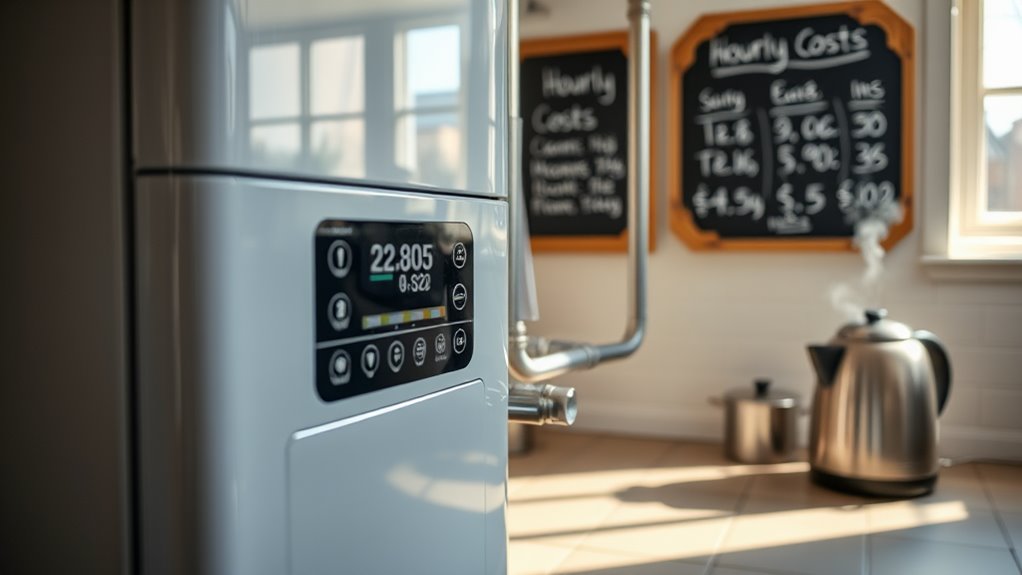The cost of running a boiler in the UK typically ranges from £300 to £600 annually, translating to approximately £0.83 to £1.64 per hour, depending on fuel type and efficiency. Factors like installation quality, maintenance, and boiler age also impact running costs considerably. To maximize energy efficiency and reduce expenses, it is crucial to maintain your boiler properly. Learn how specific choices influence your overall boiler costs for a more informed decision.
Key insights
- Boiler running costs in the UK range from £300 to £600 annually, translating to approximately £0.83 to £1.64 per hour.
- Fuel type significantly influences hourly costs, with natural gas typically being the cheapest option for households.
- Efficiency ratings of the boiler affect operational costs; higher efficiency means lower fuel consumption and costs.
- Regular maintenance can prevent inefficiencies, helping to keep hourly operating expenses lower over time.
- Energy audits and proper insulation can optimize performance, further reducing boiler costs per hour.
Understanding Boiler Efficiency Ratings
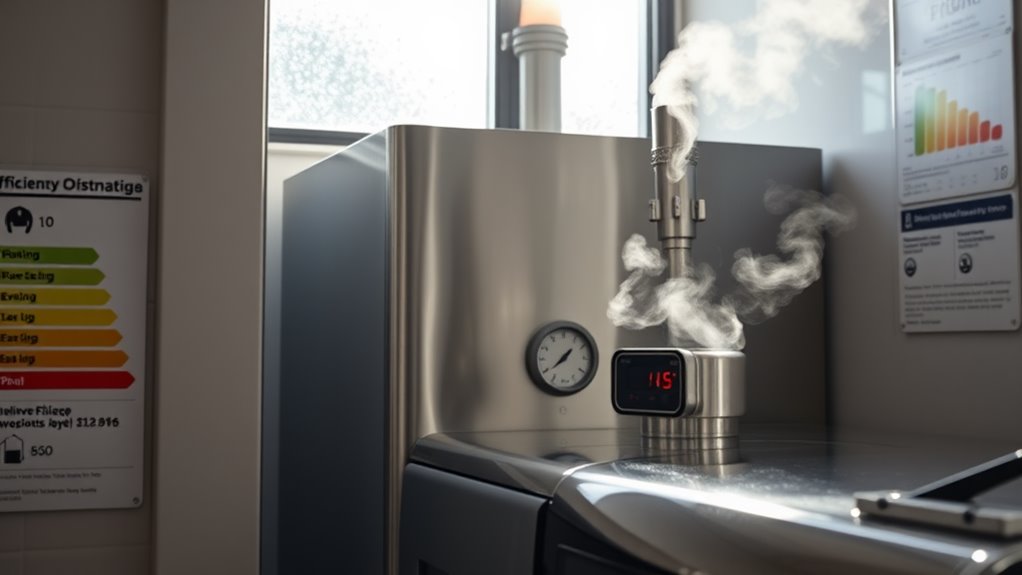
How do you determine a boiler's efficiency? To assess boiler efficiency, you'll need to look at the efficiency ratings provided by the manufacturer. These ratings indicate how effectively the boiler converts fuel into heat. Typically expressed as a percentage, a higher efficiency rating means less fuel is wasted. For instance, if a boiler has an efficiency rating of 90%, it means 90% of the fuel is used for heating, while 10% is lost. You can also calculate the efficiency by dividing the useful heat output by the energy input. Understanding these ratings is essential for evaluating the performance of your boiler and making informed decisions about energy consumption and costs. Always refer to the latest standards and guidelines for accurate assessments. Regular maintenance, such as commercial boiler service, plays a crucial role in optimizing efficiency and ensuring reliable operation.
Factors Affecting Boiler Operating Costs
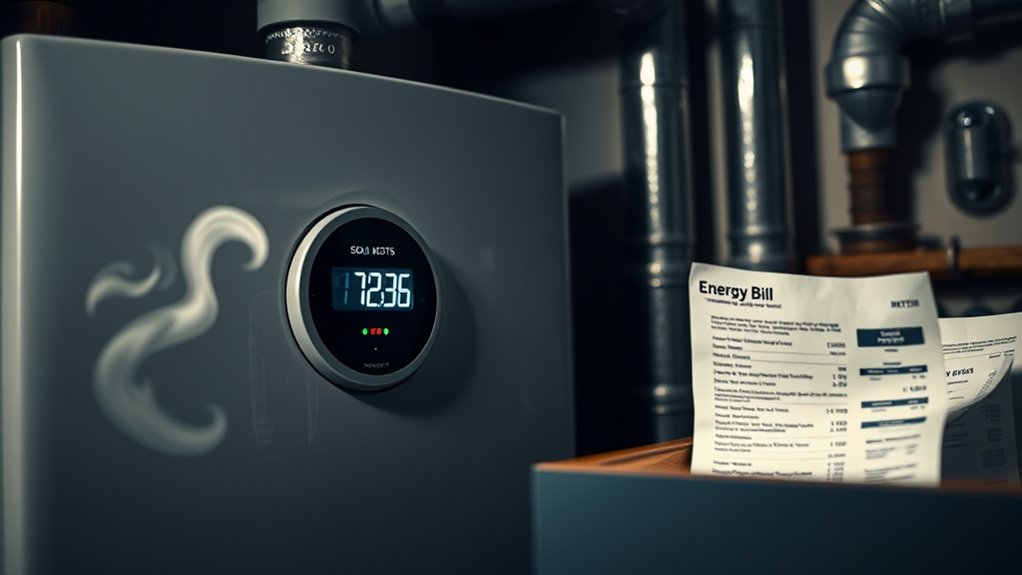
Boiler efficiency ratings play a notable role in determining operating costs, but several other factors come into play as well. One major factor is the installation costs; a poorly installed boiler can lead to inefficiencies, increasing your overall expenses. Additionally, the type of fuel used impacts costs considerably—gas, oil, and electricity have varying prices.
Maintenance expenses should also be considered; regular servicing can prevent costly breakdowns and guarantee peak performance. Furthermore, the age of your boiler can affect efficiency; older models tend to consume more energy. Finally, the size of the boiler in relation to your heating needs is vital—an oversized unit can lead to unnecessary energy waste, while an undersized one may struggle to meet demand. Proper boiler installation is crucial for ensuring optimal efficiency and minimizing operating costs.
Average Boiler Running Costs in the UK

In the UK, average boiler running costs typically range from £300 to £600 annually, depending on fuel type and boiler efficiency. By regularly investing in boiler maintenance, you can guarantee peak performance, reducing unnecessary expenses. A well-maintained boiler operates more efficiently, translating into energy savings over time. Factors such as the boiler's age, model, and the energy source you choose greatly influence your running costs. For instance, modern condensing boilers are designed to maximize energy efficiency, which can lead to lower bills. Additionally, tracking your usage patterns can help identify areas for improvement, allowing you to make informed choices about your energy consumption. Ultimately, maintaining your boiler is essential for achieving the best running cost outcomes. Regular maintenance also ensures compliance with safety regulations, further protecting your investment.
Comparing Different Fuel Types
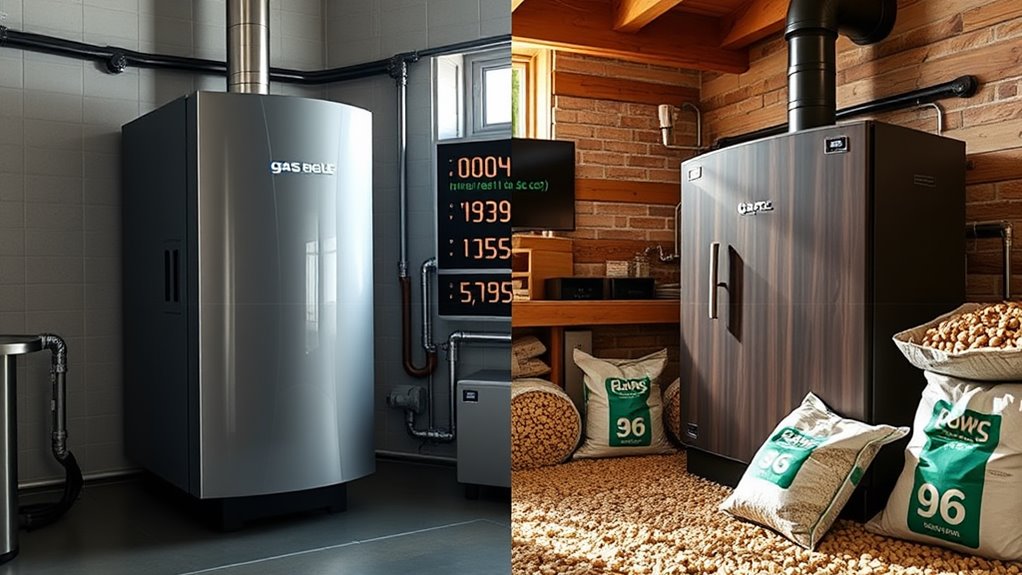
When considering boiler running costs, the type of fuel you choose plays a significant role in overall expenses. Fuel price comparisons reveal that natural gas often offers the lowest cost per unit, making it a popular choice for many households. However, oil and LPG can be more expensive, depending on market fluctuations. Additionally, you should factor in the environmental impact; switching to renewable energy sources, like biomass or electric boilers, reduces carbon emissions but may have higher upfront costs. Ultimately, balancing fuel efficiency, cost, and sustainability is essential. By examining these factors, you can make an informed decision that aligns with both your budget and environmental values. Furthermore, considering options like commercial heat pumps can provide an energy-efficient alternative that significantly reduces operational costs over time.
Tips for Reducing Boiler Costs
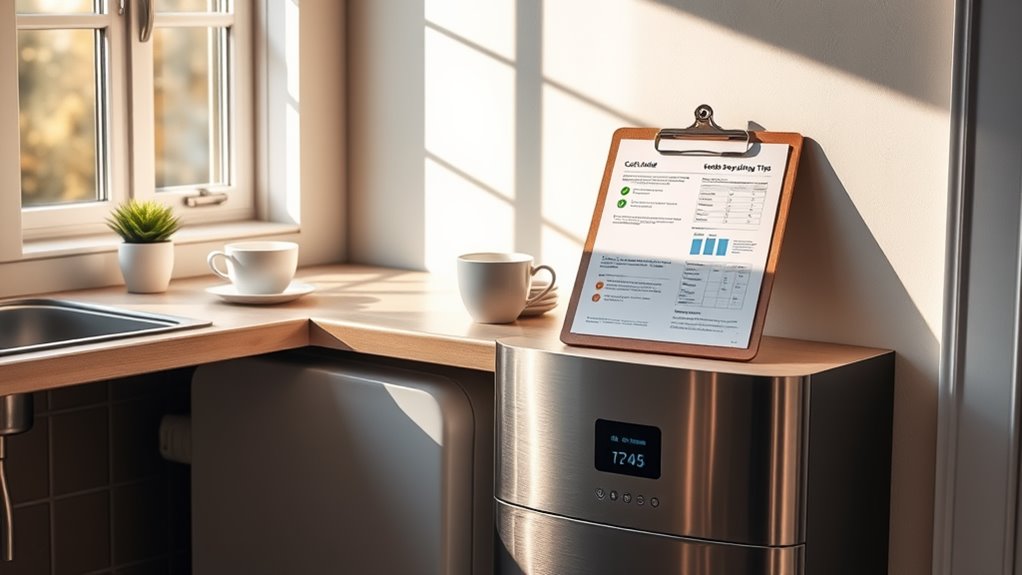
To effectively reduce boiler costs, implementing a few key strategies can lead to considerable savings. Here are three essential tips:
- Regular Boiler Maintenance: Schedule routine maintenance checks to guarantee your boiler operates efficiently. This can prevent costly repairs and extend its lifespan.
- Conduct Energy Audits: Assess your energy usage through professional energy audits. Identifying areas of inefficiency allows you to optimize boiler performance and reduce energy consumption.
- Insulate Pipes and Tanks: Proper insulation minimizes heat loss, guaranteeing that your boiler doesn't have to work harder than necessary. This simple step can considerably lower your energy bills. Additionally, consider regular power flushing to remove sludge and debris that may hinder efficiency in your heating system.
Frequently Asked Questions
How Can I Determine My Boiler's Hourly Cost?
To determine your boiler's hourly cost, start by evaluating its efficiency rating. Higher efficiency means lower fuel consumption. Next, check your energy prices; this varies based on your supplier and current market rates. Multiply the boiler's fuel consumption per hour by the cost of your energy source. By combining these factors, you can calculate an accurate estimate of your boiler's operating cost per hour, helping you manage expenses effectively.
Are There Government Grants for Boiler Replacements?
Yes, there are government grants available for boiler replacements, particularly aimed at enhancing energy efficiency. These boiler grants can help you cover part of the costs associated with upgrading to a more efficient model. To qualify, you'll typically need to meet certain criteria, like income thresholds and property eligibility. Check your local government's website or contact energy providers for specific programs that might benefit you and improve your home's efficiency.
What Is the Lifespan of a Typical Boiler?
A typical boiler's lifespan ranges from 10 to 15 years, depending on its type and maintenance. To maximize boiler longevity, you should schedule regular check-ups and keep an eye on any unusual noises or leaks. Cleaning filters and ensuring proper ventilation also helps. By following these maintenance tips, you can enhance efficiency and extend the life of your boiler, ultimately saving you money on replacements and repairs in the long run.
Can I Install a Boiler Myself?
You can install a boiler yourself, but it's essential to weigh the DIY considerations carefully. Boiler installation involves complex plumbing and gas connections, which require specific skills and knowledge of safety regulations. If you're not experienced, you might face serious risks, including potential leaks or malfunctions. Always check local regulations, as some areas mandate professional installation. If in doubt, hiring a qualified technician guarantees compliance and safety for your home.
How Do I Know if My Boiler Needs Servicing?
To determine if your boiler needs servicing, watch for common boiler symptoms like unusual noises, leaks, or inconsistent heating. Regularly consult your maintenance checklist, which should include checking pressure levels, inspecting for corrosion, and ensuring all controls function properly. If you notice any red flags, it's essential to schedule a service. Regular maintenance not only prolongs your boiler's lifespan but also enhances efficiency and safety in your home.
Summary
In conclusion, understanding your boiler's efficiency and the factors influencing its operating costs is vital for effective budgeting. Average running costs in the UK vary based on fuel type and usage, so it's worth comparing options to find what's best for you. By implementing energy-saving tips, you can further reduce expenses. Staying informed about these aspects will help you manage your boiler costs more effectively and guarantee peak performance throughout the year.

